Diversifying with Forestry Machinery
Download this Farm Woodlands Information Note
The Forestry Grant Scheme (FGS) comprises a wide range of forestry-related grants, including Harvesting and Processing (H&P) grants. These grants are for the purchase of small-scale, non-industrial machinery with the aim of bringing woodlands back into management, adding value to local economies and to encourage farmers to diversify. This Information Note summarises details on these FGS grants for Aim 1 applicants, (diversification) and show-cases two farmers who have utilised it.
Forestry Grant Scheme
The H&P grants are specifically aimed at small-scale, non-industrial machinery. This means:
- Harvesting and extraction equipment with capacity of less than 10,000m3 per annum, e.g. small-scale thinning harvesters < 9t, thinning harvester heads, small-scale forwarders < 6t, timber grabs and timber trailers.
- Primary timber processing equipment with capacity of less than 5,000m3 per annum, e.g. firewood log processors, saw benches, sawn-timber drying kilns.
- Secondary processing equipment with capacity of less than 500m3 per annum, e.g. circular or band saws, planers, thicknessers, moulders and stand-alone sanders.
The grant supports only forestry-specific equipment, so prime movers such as tractors and excavators are ineligible. Chippers are also ineligible. Machinery must be used beyond the applicant’s property i.e. it must provide a service to the wider economy. Like-for-like replacement is not permitted, but replacement with an upgraded model is permitted
The grant pays 40% of the cost, up to a maximum of £50,000 per application (minimum grant of £2,500); multiple applications are permitted. Applicants must submit three quotes (with grant value based on the lowest quote), a quotation summary, a completed business plant template and usually letters of support to demonstrate demand. Quotes must be from three different manufacturers (i.e. not three different suppliers of the same machine). Funding does not cover VAT.
Applications are assessed at judging rounds, usually two are held per year. Machinery must be purchased, on site and grant claimed by 31 March of the following year. Grants are paid after the purchase of the machinery, so applicants must be able to fund the purchase until grant is received. All applications are assessed using published scoring criteria. Details of these, and further information on the H&P grant can be found on the Rural Payments website.
Case Study: Bogside Farm, Fife
Located near Blairadam in Fife, John Keddie and family farm over 260ha of arable land comprising oats, barley, wheat and oil seed rape, as well as making haylage for the equestrian market.
The family started supplying air-dried hardwood firewood logs to local buyers in 2015. Using a shared firewood processor at first, the Keddies formed their own company, Logline, and established an online presence. Spare yard space was used to stack the logs (purchased from local and national timber merchants) for a period of two years before cross-cutting and splitting, which takes place inside the former dairy buildings.
With a focus on quality along with home delivery and stacking, word of mouth generated a substantial increase in sales, to the point that by 2017 the Keddies were selling 300t of dried firewood a year. To keep up with demand and make the business more efficient the decision was made to invest in their own equipment:
- Hakke Pilke Easy 43 firewood processor, with eight-part splitting blade, sawdust blower, oil cooler and conveyor system; for cutting logs into clugs and splitting clugs into firewood.
- Hakke Pilke tumble cleaner for logs.
- Palms timber trailer with grab for moving logs in and around the yard.
Total cost of the investment was £47,995, with FGS H&P funding providing £19,198. This allowed production to be increased to 400t+ per year, creating capacity for two full-time rural jobs along-side the Keddie’s own input, and increasing turnover by 50%.
A further investment was made in 2020, purchasing an LMS Woodbuster 870 log-splitter (grapple action; cone-splitters are ineligible). This allows larger diameter logs to be accepted in log deliveries, reducing them efficiently to diameters that the firewood processor can handle, giving Logline greater flexibility in the sizes of logs it purchases. Costing £7,000, FGS H&P funding provided grant of £2,800.
John says “The firewood business is a good fit with the arable farming as they both have peaks at different times of the year. So it’s been a great help that FGS funding was able to help us buy equipment that allows us to remain productive year-round.”
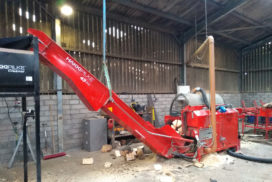
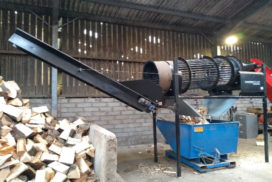
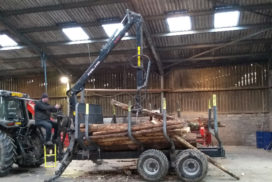
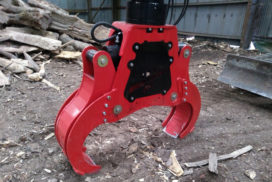
Case Study: Brackenhirst Farm, Cumbernauld
Owned by David and James Shanks, Brackenhirst Farm is a beef farm with an Angus suckler herd of 70, plus followers, and includes over 80ha of woodland and forestry. Of this, 47ha comprises largely Sitka spruce around 25 years old which has been thinned once, and the remainder mixed broadleaves around the farm.
The brothers also own Shanks Soils Ltd which is based at the farm, formed in 1995 to supplement farm income after pulling out of dairy and sheep farming, and specialises in landscaping, sports pitches and site clearance for developers. A key part of the service is that Shanks Soils are able to remove felled trees from sites and transport them back to their yard for conversion into firewood, redirecting considerable volumes of timber from landfill.
The existing Botex timber trailer was becoming increasingly difficult and expensive to maintain in a road-worthy condition, and was incompatible with the company’s newest tractors, reliant instead on being coupled with the brothers’ aging and slow Valtra T121 (max. speed 18mph). The trailer was also limited in the size of logs it could carry, with the result being that larger logs had to be cross-cut into firewood on site (time-consuming and inefficient), or sent to landfill (expensive).
David and James decided to upgrade and invest in a new Botex Euro-11 timber trailer with 570C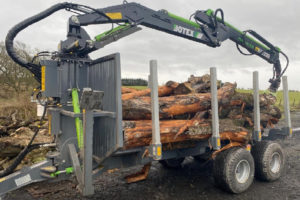 timber crane, which would require much less maintenance and repair. Coupled with the new Valtra T194, it brings timber back to the yard at a speedy 32mph. The trailer is capable of handling a much wider range of log size, meaning virtually all timber can be transported back to the yard, typically in 4.6m lengths with no on-site processing. This makes their operation much more efficient and has allowed David and James to respond to an increase in demand for site clearance, seeing a 50% increase in timber extracted. The trailer is also used for extraction from felling and windblow clearance from their own woods. At a cost of £28,900, FGS funding contributed £11,560.
timber crane, which would require much less maintenance and repair. Coupled with the new Valtra T194, it brings timber back to the yard at a speedy 32mph. The trailer is capable of handling a much wider range of log size, meaning virtually all timber can be transported back to the yard, typically in 4.6m lengths with no on-site processing. This makes their operation much more efficient and has allowed David and James to respond to an increase in demand for site clearance, seeing a 50% increase in timber extracted. The trailer is also used for extraction from felling and windblow clearance from their own woods. At a cost of £28,900, FGS funding contributed £11,560.
At the same time the brothers’ firewood business was growing. Sales were based on word-of-mouth, with good quality air-dried hardwood being split with a home-built log splitter. This too was an aging piece of equipment with frequent breakdowns. Struggling to keep up with demand and relying on inefficient equipment, David and James applied for FGS funding to purchase a Posch 20t Hydrocombi Firewood Log Splitter; costing £5,950, FGS funding contributed £2,380. This has allowed firewood production to double, from 100m3 per year to 200m3, and turnover to increase by 100%.
Of the investment David says “FGS funding was crucial to improving the efficiency of our business and improve our service to customers. Without the grants we would have continued to struggle with old and inefficient kit, so we’re delighted that the financial assistance has allowed us to work smarter, not harder”.
The combination of these investments has resulted in the creation of one additional rural job.
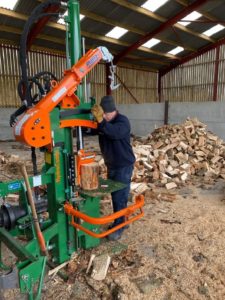
Sign up to the FAS newsletter
Receive updates on news, events and publications from Scotland’s Farm Advisory Service

